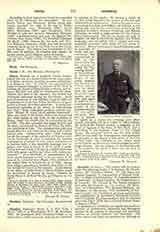

Coudert, FREDERIC RENE, b. in New York, March 1, 1832; d. at Washington, D.C., December 20, 1903. He graduated from Columbia College in his native city in 1850, and on his majority was admitted to practice in the courts. He became a leader of the Bar, being learned in the science of the law and skilled in its art and practice. During the controversy concerning American and British seal fisheries in the Bering Sea, and in the controversy concerning the disputed boundary between Venezuela and British Columbia, he acted as legal adviser for the United States Government. He was an orator not only in English, but also in the French, Spanish, and Italian languages, and was gifted with a manner and style singularly attractive, with ready wit and power of sarcasm. He bore testimony to his political principles in periods of strain and controversy. He consented in 1876 to visit Louisiana for the purpose of urging the “Re-turning Board” of that politically distracted State to act justly respecting election returns which were to determine the presidential succession, and in 1892 and again in 1893 he was a prominent opponent of the courses taken by his own political party. Politics he seemed to regard as a means for carrying into effect certain principles, not as a means of office-seeking. He declined the Russian mission, a judgeship of the Court of Appeals of the State of New York, and a justiceship of the Supreme Court of the United States. He accepted (and it was the only public office he ever held) the inconspicuous and unsalaried membership in the Board of Education of the City of New York. As a Catholic he was always loyal to the Church; as the son of a French refugee he never forgot France. On two subjects he declared himself to be sensitive: the Bark of Peter and the land of his ancestors.
CHARLES W. SLOANE

